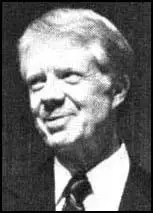Jimmy Carter

James Earl Carter, the son of a peanut farmer, was born in Plains, Georgia, on 1st October, 1924. He graduated from the United States Naval Academy in 1946 and worked for several years on the nation's nuclear submarine program. When his father died of cancer in 1953, Carter resigned his commission and took over the running of the family peanut farm.
Carter, a member of the Democratic Party, won election to the Georgia State Senate in 1962. A popular local politician, Carter became Governor of Georgia in 1970. Carter election represented the change that had taken place in the Deep South following the passing of the Civil Rights Act (1964) and the Voting Rights Act (1965).
In his inaugural address Carter announced that "the time for racial discrimination is over" and during his period of office (1970-74) he increased the number of African American appointees on major state boards and agencies from three to fifty-three and the number employed by the state rose to 40 per cent.
In 1974 Carter announced his plans to seek the presidency. Virtually unknown outside Georgia, at first he was not considered a serious candidate but in February, 1976 he won the New Hampshire primary. This was followed by sixteen more victories and Carter was elected on the first ballot at the 1976 Democratic National Convention. He selected Walter Mondale as his vice presidential candidate.
During the presidential campaign Carter made unemployment a central issue and announced plans to create jobs by increased federal spending. He also promised to pardon draft evaders during the Vietnam War and to reorganize government bureaucracy. Gerald Ford, handicapped by his association with Richard Nixon and the Watergate conspiracy, was defeated by 38,532,360 votes to 40,276,040.
Carter was the first president from the Deep South since 1844. His record of civil rights resulted in him being supported by four out of every five African Americans who voted. He also did well with whites in the South and Americans on low incomes.
Once in power, Carter quickly made good his election pledges concerning the pardoning of Vietnam War draft evaders and ending the production of the expensive B-1 bomber. He also began to reorganize federal agencies that were duplicating services. Carter also received praise for announcing that aid would be cut to those foreign governments guilty of human rights violations.
In 1977 President Carter appointed Stansfield Turner as Director of the Central Intelligence Agency. The journalist, Edward Jay Epstein, has pointed out that: "Although Turner had had little previous experience in intelligence, he viewed it simply as a problem of assessing data... he assumed that he could bring the CIA, and American intelligence, to the same standard of operational efficiency he had brought the ships under his command. He quickly found, however, that the CIA was a far more complex and elusive entity than he had expected.... Not only did he view such secrecy as irrational, he began to suspect that it cloaked a wide range of unethical activities. He became especially concerned with abuses in the espionage division."
Turner discovered that President Richard Nixon and the CIA had been involved in the overthrow of Salvador Allende, the elected leader of Chile. "Complementing the CIA effort, the US government exerted economic pressure on Chile, again to no avail. A second approach, entirely under CIA auspices, encouraged a military coup. President Richard Nixon directed that neither the Departments of State and Defense nor the US Ambassador to Chile be informed of this undertaking."
Carter's popularity was badly damaged in November, 1979, when student militants in Iran seized the United States embassy in Teheran and took 52 hostages. The students demanded that the hostages would be held until the Shah, the country's former leader, who was in the United States for medical treatment, was handed over to the government of Iran. Carter imposed economic sanctions on Iran and when that failed to work, ordered an armed rescue. This failed and Carter's approval rating during the summer of 1980 slumped to 21 per cent, the lowest figure ever recorded by a president.
Carter's administration was also unable to deal successfully with the country's mounting economic problems. Inflation had risen throughout his presidency and by 1980 had reached 15 per cent. With the Iran hostage crisis still unsolved, Carter had little chance against Ronald Reagan, his Republican Party opponent in the 1980 presidential election. Carter was easily defeated, receiving only 35 million votes to Reagan's 44 million.
After leaving office Carter continued to be active in politics. In 1981 he established the Carter Center which sponsored programs promoting human rights in third world countries. He has also been involved in negotiating the end of human rights abuses in Nicaragua, Panama, Ethiopia and Haiti.
In 2002 he was awarded the Nobel Peace Prize "for his decades of untiring effort to find peaceful solutions to international conflicts, to advance democracy and human rights, and to promote economic and social development".
Jimmy Carter died at his home in Plains, Georgia, on 29th December, 2024, at the age of 100.

